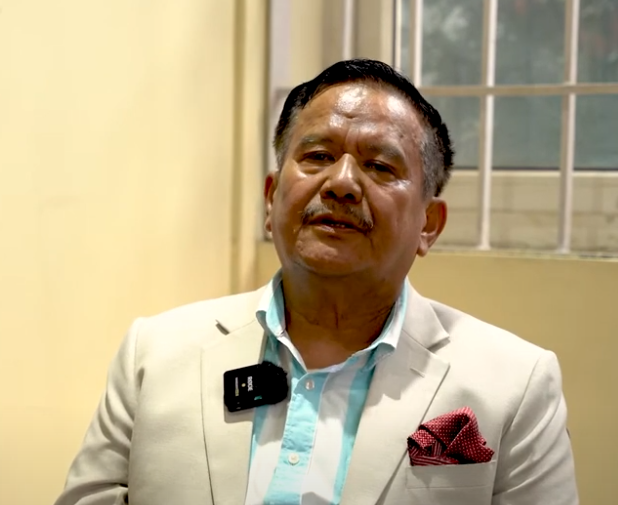In Nepal, Min Bahadur Gurung has long been regarded as a representation of superior domestic retail. His rise from a small Kathmandu shopkeeper to the head of a billion-rupee empire is still incredibly motivating. Despite never having been formally verified, business analysts have estimated his net worth to be over NPR 10 billion, a sum that highlights both his strategic acumen and his economic influence. Gurung is especially fascinating because of his financial success as well as the way it was developed over decades, step by deliberate step.

He didn’t get here with a big IPO or international brand deal. Instead, his tale started with a modest store in the Bhat Bhateni district, where he started providing residents with dependability, selection, and incredibly low costs. This little store eventually grew into the most well-known supermarket chain in Nepal. Gurung had an exceptionally good grasp of market gaps. Long before that became a retail trend or a political talking point, he recognized the need for cleaner, more convenient shopping options for the expanding middle class.
Min Bahadur Gurung – Personal and Professional Summary
| Attribute | Information |
|---|---|
| Full Name | Min Bahadur Gurung |
| Nationality | Nepalese |
| Occupation | Entrepreneur, Businessman |
| Title | Chairman & Managing Director of Bhat Bhateni Supermarket |
| Years Active | 1980s–Present |
| Education | Master’s Degree in Economics |
| Spouse | Sabitri Ghale Gurung |
| Company Employees | Over 4,500 |
| Known For | Founding Nepal’s largest private retail chain |
| Legal Status | Arrested in 2023 for alleged involvement in Lalita Niwas land case |
| Philanthropy | Donated NPR 110 million to disaster relief efforts in 2024 |
| Reference |
He provided an experience that was especially novel in Nepal at the time by establishing an atmosphere that combined contemporary store designs with local accessibility. Local Bhat Bhateni stores developed into hubs for the community, offering families a one-stop shop for everything from electronics to fresh produce. Gurung used highly effective supply chains and strategic real estate purchases to meet demand as urban areas grew and consumer behavior evolved. He scaled without sacrificing consistency or quality.
Gurung’s company structure is also very individualized. In addition to being a shareholder, his wife, Sabitri Ghale Gurung, is a crucial decision-making partner. Insiders have characterized their cooperation as incredibly dependable, establishing an operational rhythm that has endured political unrest and market shocks. Many people consider the Gurung family’s self-made rise to be an uncommon and genuine success story in an economy that is frequently controlled by monopolies or politically connected cartels.
However, that story took a dramatic turn in June 2023. Gurung was taken into custody on suspicion of being involved in the Lalita Niwas land scam, a well-known dispute involving the theft of land owned by the government. Even though the investigation is still ongoing, the incident had a big impact on his reputation. Gurung’s reaction, however, was measured. He didn’t make aggressive remarks or launch a counteroffensive in the media. Rather, his attention seemed to stay on business continuity, letting his decades-long experience do the talking.
He made a donation shortly after his legal issues that caused a stir in the country’s politics. Gurung donated more than NPR 110 million in September 2024 to aid those affected by devastating floods and landslides in Nepal. Many people applauded the gesture. Its effect was unquestionably positive, regardless of whether it was driven by strategy, guilt, or true empathy. Survivors were given food and shelter right away, and relief centers in the impacted districts reported a noticeably better distribution of aid. It served as a potent reminder that private funding can expedite disaster response more quickly than many government initiatives if it is strategically redirected.
The charitable endeavor also brought attention to a fascinating pattern among the wealthiest businesspeople in Asia. Gurung’s donation was both socially beneficial and reputationally restorative, much like that of Indonesian magnate Tahir or Indian billionaire Azim Premji. When legacy is under legal scrutiny, these acts of extreme generosity have emerged as a particularly helpful strategy for reestablishing a connection with the public and changing the narrative.
Beyond the news, Gurung’s impact permeates Nepalese culture. Almost every urban household has at least one item that was bought from a Bhat Bhateni store. Because of how adaptable that reach is, his brand can continue to turn a profit even during recessions. Workers at all of his locations say that, in contrast to many other retail employers, the work environment is stable but closely managed. The supermarket is still a popular place to work because of its reputation for on-time payments and stable job security, especially for young adults looking to become financially independent.
But the future is changing. Even in developing countries, the retail industry is rapidly digitizing. Younger consumers are increasingly choosing doorstep delivery over parking lots and congested aisles, and online grocery platforms are growing in popularity. Integrating a digital ecosystem will be essential if Gurung hopes to maintain his dominance. Although insiders indicate that app development and online ordering systems are currently underway, his model has so far been primarily brick and mortar.
Gurung’s leadership finds itself at a turning point in this changing situation. He has already demonstrated his ability to spot trends early and create incredibly resilient systems. He now has to use those same instincts with new technologies, though. His company may not only survive but flourish internationally if he can accomplish that while upholding consumer confidence and regulatory openness.
